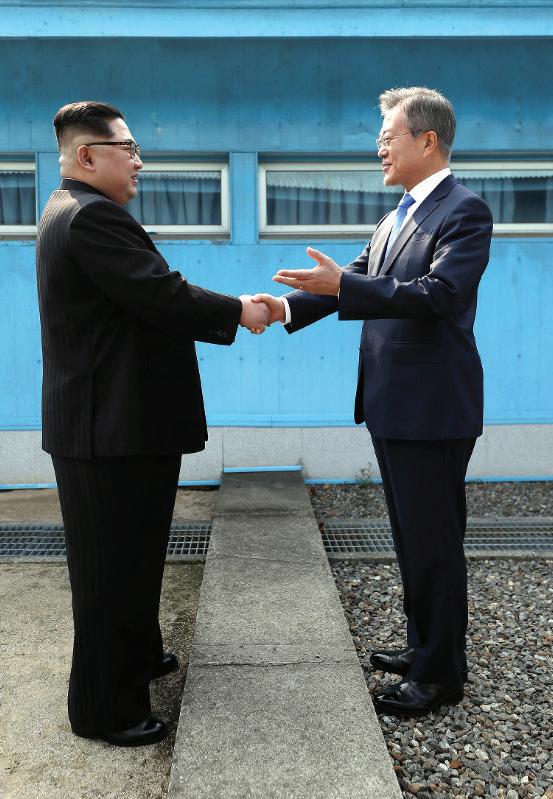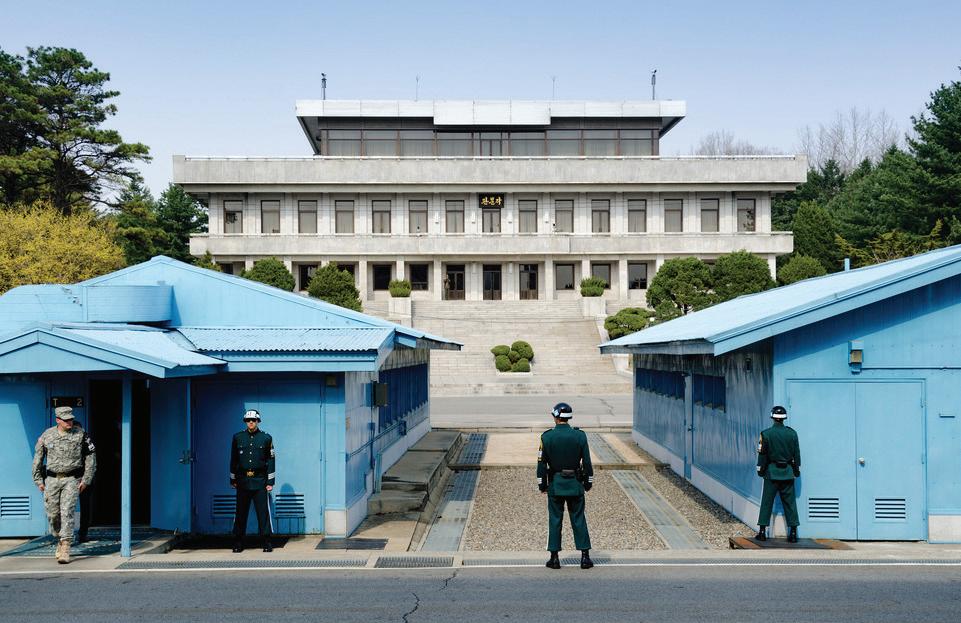
5 minute read
Regional dynamics
This section outlines the interests of the four most important regional actors to the conflict: South Korea, China, Japan and Russia. While this report focuses on the negotiations between the United States and North Korea, each of the four countries has an important stake in their outcome. While the short-term scope of this report inhibits a full incorporation of regional priorities into the recommendations, being cognizant of these dimensions is critical for the United States in developing a long-term strategy for the region.
South Korea
South Korea’s current government seeks to end enmity with North Korea. While it sees the nuclear threat as significant and favors denuclearization, South Korea’s geographic proximity also makes conventional, as well as biological and chemical weapons, important security concerns.16 South Korea also wants to reduce cross-border skirmishes, as demonstrated through its willingness to disarm the Joint Security Area in Panmunjom, while seeking the reduction of medium- and long-range missiles in the region.
RUSSIA
CHINA NORTH KOREA
SOUTH KOREA JAPAN
China
16 Haltiwanger, J. (2018, January 10). North Korea’s Chemical Weapons Most Overlooked Threat from Rogue State, Experts Warn. Newsweek. Retrieved from https://www.newsweek.com/north-koreas-chemical-weapons-most-overlookedthreat-rogue-state-experts-warn-776207
HEADER
Moreover, South Korea sees moving quickly as critical. The current moment is a rare opportunity where the United States, South Korea, and North Korea are simultaneously willing to negotiate, while conservative domestic opposition is limited. South Korea is seeking to promote inter-Korean dialogue and economic integration alongside the denuclearization agenda to assure concrete change. To that end, South Korea appears willing to relax its unilateral sanctions against North

Caption: Kim Jong Un and South Korean President Moon Jae In shake hands at the DMZ to mark the signing of the Panmunjom Declaration. Image Credit: mainichi.jp
Korea17 while also supporting a peace declaration symbolically ending the Korean War.18 These steps are seen as both directly reducing the threat from North Korea, while also serving as important confidence-building measures in the negotiations.
China
China’s main goal is stability on the Korean peninsula. It wants North Korea to exist to maintain the buffer between it and the U.S. troops in South Korea. China also fears the negative impact on Chinese domestic cohesion of any destabilization of North Korea (such as through an influx of refugees). However, China also supports denuclearization, given it would lessen the threat of a U.S. attack, while also limiting the likelihood that South Korea and Japan would seek to acquire nuclear weapons.19
While China has broadly enforced the UN sanctions regime, it wants the United States to begin to ease sanctions in response to North Korean concessions (e.g. stopping missile and nuclear tests) and to address North Korea’s underlying insecurity.20 To that end, China also supports a peace declaration, steps towards political normalization, and reducing military tension.21
Japan
Interviews with former government officials and academics familiar with the current Abe administration revealed that Japan’s primary goal is regional stability and guarding against a rising China. While Japan felt it was blindsided by the “Trump shock”—President Trump’s accepting a summit with Kim—it is cautiously supportive of the negotiations to the extent to which they ease regional tensions. Japanese officials expressed their strong desire for full denuclearization as the only acceptable outcome of this process. They noted their belief that their homeland—specifically U.S. bases on Honshu—would be North Korea’s primary target in a first-strike scenario. In a point of potential divergence from the United States, Japan also views North Korean conventional weapons as a serious threat and will push for any final deal to include all such missiles.22
17 Samuels, B. (2018, October 10). South Korea Mulls Lifting Sanctions Against North: Report. The Hill. Retrieved from https://thehill.com/policy/international/410726-south-korea-mulls-lifting-sanctions-against-north 18 Multiple News Sources. (2018, October 12). Moon Jae-In Urges Us to Declare End of War with North Korea. Al Jazeera. Retrieved from https://www.aljazeera.com/news/2018/10/moon-jae-urges-declare-war-north-korea-181012093637194.html 19 Dalton, T., Michishita, N., & Zhao, T. (2018, June 11). Security Spillover: Regional Implications of Evolving Deterrence on the Korean Peninsula. Carnegie Endowment For International Peace. Retrieved from https://carnegieendowment.org/2018/06/11/security-spillover-regional-implications-of-evolving-deterrence-on-korean-peninsula-pub-76483 20 Perlez, J. (2018, August 25). Is China Undermining Efforts to Disarm North Korea? Not Yet, Analysts Say. The New York Times. Retrieved from https://www.nytimes.com/2018/08/25/world/asia/china-north-korea-sanctions. html 21 Bosack, M. (2018, October 24). Why China and Russia are Keen for the Korean War to Officially End. The Diplomat. Retrieved from https://thediplomat.com/2018/10/why-china-and-russia-are-keen-for-the-korean-war-to-officially-end 22 Japan’s core policy relative to North Korea is commonly formulated as seeking “a resolution of the abduction,
Japan views a peace declaration as a major U.S. concession that should be reserved until North Korea takes concrete steps that reduce the nuclear threat. It was suggested that if a peace declaration is delivered, Japan would likely seek reaffirmation of the Japan-U.S. alliance and assurance that it remained under the U.S. “nuclear umbrella.”23 Finally, Prime Minister Abe has built his political career on addressing the abduction of Japanese citizens by North Korea, and achieving some sort of resolution to the abductee issue is likely to be a prerequisite for the eventual disbursement of reparations to North Korea.
Russia
Russia’s primary interest in rapprochement with North Korea is economic, specifically increasing its exports of the vast energy reserves of Russian Siberia and the Far East to the high demand markets of East Asia.24 Similarly to China, Russia has supported the UN sanctions regime but does not want long-term North Korean isolation given its future trading potential.25 It is supportive of inter-Korean peace as well as denuclearization since it would promote stability and provide less justification for a U.S. security presence in the region.26
nuclear and missile issues”. Both current and former Japanese officials characterized the position in this way; Kelly, T., Kim, K., & Jung, H. (2018, March 13). Japan Tells South Korea It Wants Abduction Issue Resolved in North Korea Talks. Reuters. Retrieved from https://www.reuters.com/article/us-northkorea-missiles-japan-southkorea/ japan-tells-south-korea-it-wants-abduction-issue-resolved-in-north-korea-talks-idUSKCN1GP06I 23 Shanker, T., & Johnson, I. (2012, September 17). U.S. Accord With Japan Over Missile Defense Draws Criticism in China. The New York Times. Retrieved from https://www.nytimes.com/2012/09/18/world/asia/u-s-and-japan-agreeon-missile-defense-system.html?ref=asia 24 Cha, V. D. (2012). The Impossible State: North Korea, Past and Future (pp. 395). New York, NY: HarperCollins. 25 Economy, E. C. (2018, June 7). Russia’s Role on North Korea: More Important than You Might Think. CFR. Retrieved from https://www.cfr.org/blog/russias-role-north-korea-more-important-you-might-think 26 Bosack, M. (2018, October 24). Why China and Russia are Keen for the Korean War to Officially End. The Diplomat. Retrieved from https://thediplomat.com/2018/10/why-china-and-russia-are-keen-for-the-korean-war-to-officially-end






